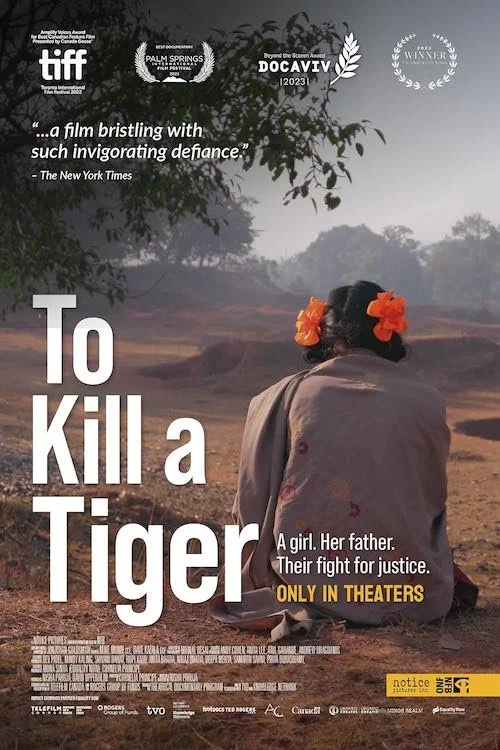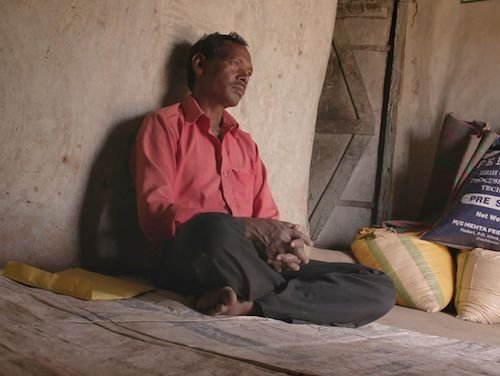To Kill a Tiger
Written by Andreas Babiolakis
Warning: The following review involves the discussion of sexual violence and rape which can be triggering. Reader discretion is advised.
Documentaries possess the power to highlight key issues in the world. Nisha Pahuja’s horrifying film, To Kill a Tiger, is full of about a thousand different issues, all hinged to one event that is featured. The girl at the forefront of this film was only thirteen years old, living in Jharkhand, India, with her family. One day, she was attacked by three men and gang raped. She would return home in the wee hours of the morning to her parents, Ranjit and Jaganti. This awful situation is sadly frequent in India, where a rape is reported allegedly every twenty minutes; the vast majority of these cases don’t even make it to trial, because conviction rates are below thirty percent. This doesn’t deter father Ranjit, who seeks justice for what has happened to his daughter. The three rapists are arrested; you would think that the story would end here. In Jharkhand, however, the law is that the woman (or, in this case, quite literally an underage girl) is at fault for this crime; she is dirty and a bad representation of the village, in their eyes. As a result, the village pressures Ranjit to drop the charges (!!!!) and bring peace to the community, as if this never happened. Oh. My. God.
To Kill a Tiger follows the unbelievable follow-up to these abominable acts and the extent that Ranjit and his family have to go to in order to maintain the protection of his daughter. You’d expect at least some clashing, given the tricky subject matter, but you’d be remiss to feel like the solutions would be simple for Ranjit. These concerns include the threats that Ranjit faces for sticking up for his daughter (sadly a stance that just doesn’t happen in this village), the financial burden of undergoing this case, and so much more. To Kill a Tiger won’t just upset you: it will fill you with the utmost rage. How could a society fail a girl so much? How could a village try to apologize for sexual abuse so heavily to the point of constantly harassing a family that is recovering from trauma? Not only does To Kill a Tiger focus on a series of highly concerning issues, but it also unearths a problematic, ghastly example that drives home just how badly rape is treated in India, how women are blamed, how abusers get away with their crimes, and so many other upsetting facts.
To Kill a Tiger may be one of the most upsetting films you see all year, but it also possesses enough perseverance to keep you hopeful in the very few good people left in this world.
As unnerving as To Kill a Tiger gets, there is also a sliver of hope found in Ranjit and his family’s quest to make things right. Their push to disallow what society expects of them is crucial. The documentary is not just about the matters at hand (and how toxic they are), but the refusal of this family to give up. It’s the light that kept this family together, and it’s the glue that holds To Kill a Tiger together as well: the film possesses an additional purpose via the purpose this family maintains for itself. Neither the family or the film will remain silent, nor should they. To Kill a Tiger is all about never giving up on what is important, and you can feel that dedication in the film’s construction itself; from the thoroughness of the subject to the professionalism of the project. Everything feels carefully researched, properly focussed, and without a cut corner any which way. To Kill a Tiger is necessary to be seen, and there’s no reason to ignore it or its message. Everyone attached to the film made sure of that. Just be prepared for the intense feelings you’ll undoubtedly experience while watching this; from fury to jubilation.
Andreas Babiolakis has a Masters degree in Film and Photography Preservation and Collections Management from Ryerson University, as well as a Bachelors degree in Cinema Studies from York University. His favourite times of year are the Criterion Collection flash sales and the annual Toronto International Film Festival.






